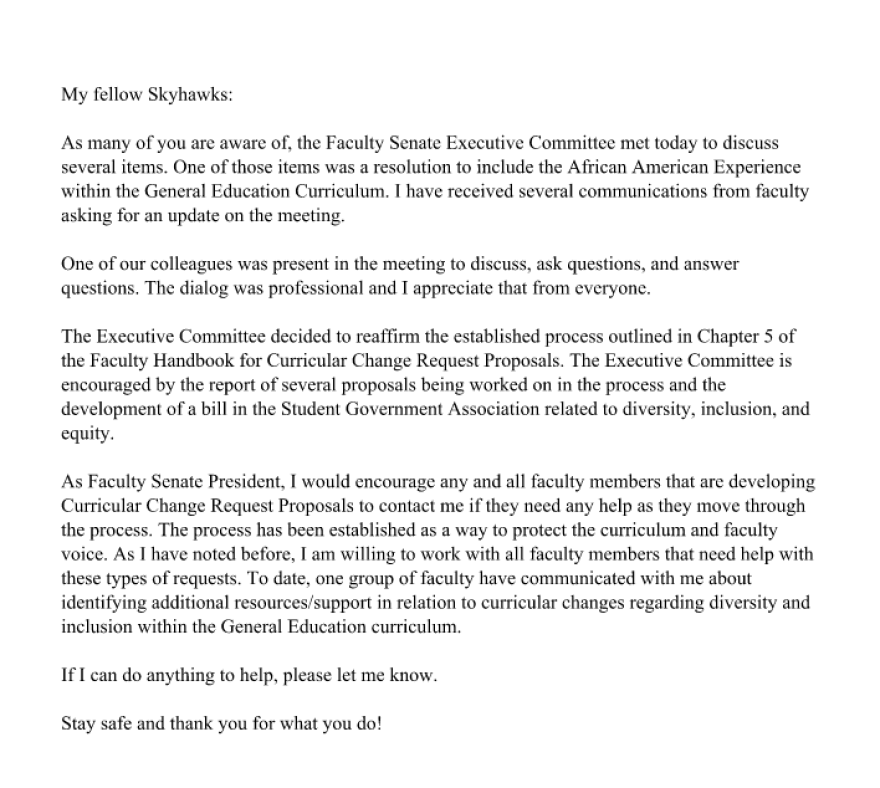This story was updated at 8 p.m.
The movement seeking a required Black history and culture course at University of Tennessee at Martin (UTM) faced another setback during yesterday’s UTM Faculty Senate Executive Committee meeting. UTM Faculty Senate President Sean Walker said none of the voting members cast a motion to vote on the resolution proposed by the UTM Black History Matters Coalition (BHMC).
Walker shared a written statement following the meeting, which stated the committee “decided to reaffirm the established process outlined in Chapter 5 of the Faculty Handbook for Curricular Change Request Proposals.” He said the committee “is encouraged” by reports of several proposals in the works, as well as development of a bill in the Student Government Association related to diversity, inclusion, and equity.
The statement reads in part: “As Faculty Senate President, I would encourage any and all faculty members that are developing Curricular Change Request Proposals to contact me if they need any help as they move through the process. The process has been established as a way to protect the curriculum and faculty voice.”

Walker also noted he’s communicated with one group of faculty members interested in identifying additional resources/support in relation to curricular changes regarding diversity and inclusion within the general education curriculum.
Dr. David Barber, UTM history professor and member of the BHMC, said the coalition has no plans to give up their cause, but the next move is unclear at the moment. He said the coalition has an upcoming meeting during which he anticipates the members begin strategizing their next moves.
“I don't think the struggle is over. I think we have every possibility of winning that struggle for a requirement. But my own opinion is that we can only do that if we bring a tremendous amount of pressure on our university leadership,” he said.
Barber said he was allowed to speak in the Zoom meeting with the faculty senate executive committee for about 45 minutes, but he wasn’t allowed to remain in the meeting to hear the committee’s discussion. He said he also wasn’t allowed to share access with student members of the coalition or members of the community.
“The argument that I made in the faculty senate executive committee is, the only way we can get this requirement is if we get the commitment of our faculty senate leadership and our administration, ‘We want the class.’ Then we sit down and we figure out how to make it happen,” he said. “It's doable. What's lacking at our university is the will to do it. If they wanted it done, it'd be done.”
“Our administration is always ready to offer kindly words and a great deal of empathy for what it is that we are doing,” he added. “But when it comes down to, concretely, ‘Do you support this thing?’ Well, ‘No.’ There's always some reason why we can't talk about that.”
The BHMC released a written statement in response to the faculty senate’s inaction, stating the resolution was non-binding, made no curricular changes and did not violate the processes or procedures of the university.
“We simply asked for a commitment from the Faculty Senate Executive Committee--a moral commitment--to work together to develop a requirement for the study of Black History and Culture,” the statement reads in part. “On November 10, the [faculty senate executive committee] refused to make that commitment, refused to say that as the leading faculty body on this campus, it would come together and collectively figure out how to make certain that all our students leave UT Martin with a meaningful understanding of Black History and Culture.”
The updated version includes the response from the Black History Matters Coalition and one of its members, Dr. David Barber.





